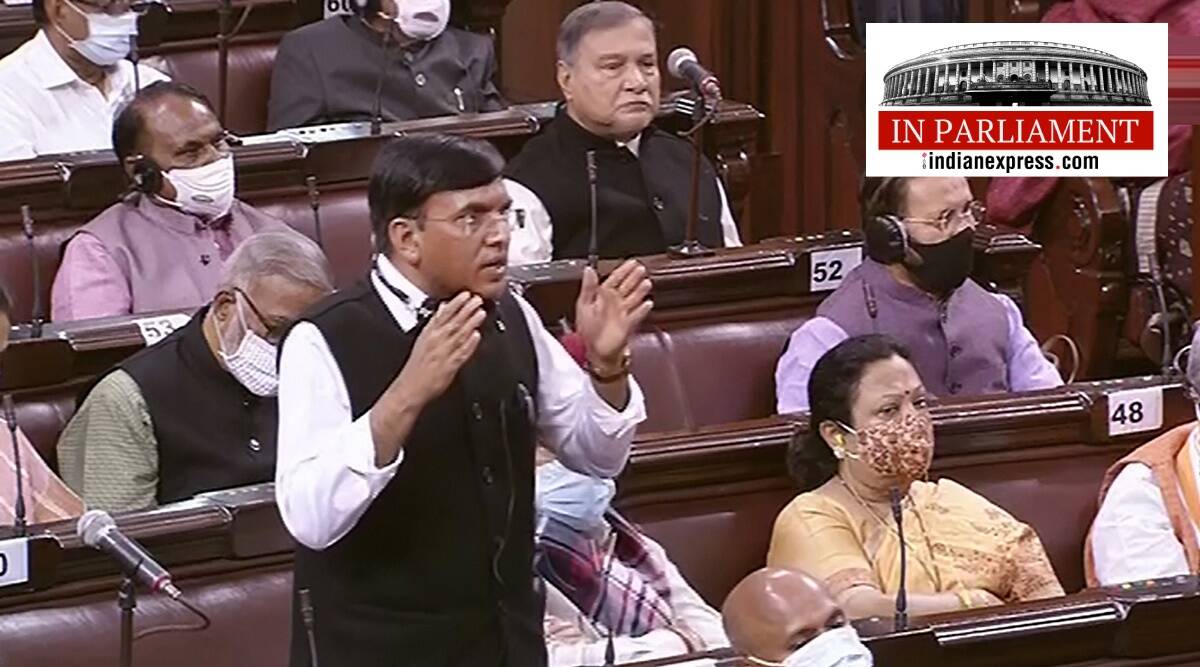 Union Health Minister Mansukh Mandaviya speaks in the Rajya Sabha during the Winter Session of Parliament. (RSTV/PTI Photo)
Union Health Minister Mansukh Mandaviya speaks in the Rajya Sabha during the Winter Session of Parliament. (RSTV/PTI Photo) Parliament on Thursday passed the National Institute of Pharmaceutical Education and Research (Amendment) Bill to accord the status of ‘institute of national importance’ to six more institutes of pharmaceutical education and research, and also set up an advisory council for them. Rajya Sabha passed the Bill unanimously by a voice vote. It was passed by Lok Sabha earlier this week.
The Bill seeks to give the coveted ‘institute of national importance’ status to pharmaceutical education and research institutes – NIPERs – situated in Ahmedabad, Hajipur, Hyderabad, Kolkata, Guwahati and Raebareli. The Bill also envisages establishment of a Council, a central body, to coordinate the activities of all the institutes to ensure coordinated development of pharmaceutical education and research and maintenance of standards.
Health Minister Mansukh Mandaviya said during a debate on the Bill that NIPERs were helping in research that could brig more patents for India, which in turn, would mean the nation can produce high-cost pharmaceuticals.
Besides, the Bill rationalises the Board of Governors of each NIPER from its existing strength of 23 to 12 members and widens the scope and number of courses run by the institutes.
Although the Bill received cross-party support, Opposition members pointed out that state governments should also get a place in the apex council of the NIPERs. They also demanded representation for SC/ST, OBC and women in the board. Samajwadi Party MP Ram Gopal Yadav and some other Opposition members sought clarity on whether national importance status would not lead to the end of OBC and SC/ST reservation at NIPERs.
Flagging issues like autonomy and over-centralisation of power, Congress’s L Hanumanthaiah said the proposed council has been empowered with excessive powers with regard to financial, administrative and managerial matters of these institutes, which has to be looked into very carefully. He said the Bill potentially compromises the institutes’ autonomy as the council will mostly be composed of central government bureaucrats and some MPs, wherein it may take decisions that may not be in a particular institute’s best interest.
Replying to a discussion on the Bill, Union Health Minister Mansukh Mandaviya said the government has accepted many recommendations made by the standing committee and some of the other suggestions would be included when the government formulates the rules. He said there are provisions for ensuring representation of ST/ST and women.
He said the Bill will strengthen NIPERs and give priority to research. Stressing on the need to strengthen research in the country, he said “there should be patents in our country. If research takes place in our country, then patents will be in the country. When patents will be in the country, then we will be able to make high cost and patented drugs. Institutes like NIPER are playing an important role in such research.” He said NIPERs would be governed on the lines of the IITs.
- The Indian Express website has been rated GREEN for its credibility and trustworthiness by Newsguard, a global service that rates news sources for their journalistic standards.

